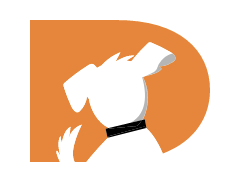
Recessions can be difficult for everyone who has to contend with increasing prices and limited budgets.
But as a dog parent, there’s no need for you to panic! Recession or not, it’s always wise to examine your financial situation, including the cost of pet parenthood. If you manage the cost of being a pet parent consistently, you’ll always feel prepared, especially for tough economic times.
At DOGTV, we like to be transparent: we have affiliate relationships with other companies. We may receive a commission on qualifying purchases made via the links in this article at no extra cost to you.
Five ways to prepare for a recession as a pet parent:
Create a budget & stick to it
Besides your normal budget tracking (money in and money out each month,) start tracking your common dog parent expenses. What do you spend on your pet’s food and how often? How much do you need to cover veterinary expenses each month? What other necessities for your pet do you pay for?
Write it all down and factor it into your monthly budget. Many pet parents don’t realize how much they spend every month on their pet, and there may be areas you can cut back on within your pet’s budget. It’ll be easier to sniff out those budget cuts when you see the facts in front of you!
By knowing how much you can afford to spend on your pets, you can identify what to cut back and save money on during a recession.
Spend smartly on your pet supplies.
Is there a generic brand of your pet’s food with comparable ingredients? Have you price-shopped different pet supply stores for your regular purchases?
Getting smarter about your spending is a surefire way to be more recession-ready!
Here are some more ideas for shopping smart and saving big bucks over time:
- Stock up. List your monthly pet supplies and buy them in bulk when they go on sale. A little note: be mindful of shelf life. Some things last a long time, so take major advantage of sales on those items.
- Find free or low-cost shipping. Buy from pet supply companies that will keep shipping costs to a minimum (or free) during a time when every dollar counts.
- Shop local. It’s how you avoid shipping costs altogether! Plus, shopping small helps to support your local community’s economy. Ask local business owners to work with you on prices or try to get a discount if you order in bulk (or just check to see if they will match or beat competitor pricing.)
Save money for unexpected pet expenses.
Revisit your pet budget (see number one) and make sure it includes X amount of dollars for your “pet fund.” You can use the money you set aside each month for emergencies or other unforeseen pet expenses. This means you’ll always have funds available to care for your dog if finances get tighter as the year goes on.
When calculating how much to put into your dog’s savings account, you can also take into account the annual vet visit to make sure your dog gets regular checkups and preventative care even during an economic downturn.
The more money you save, the better prepared you’ll be for a recession as a pet parent.
Get pet insurance.
Emergency veterinary care can be a sticker shock situation for pet parents. By budgeting for pet insurance, you’ll have peace of mind knowing that the cost of unexpected veterinary expenses will be covered (or at least a percentage of it.)
If you haven’t already bought an insurance plan for your pet, now is the time to consider saving yourself a ton of money in the long run and avoiding financial stress if your dog runs into sudden health issues or needs medical treatments and surgeries. Budget it now to avoid sticker shock later!
Speak to your vet about a wellness plan.
Your veterinarian is a valuable resource and can offer great advice on saving money on your pet care and suggest low-cost pet care options.
Sometimes veterinary offices offer healthcare plans where you pay monthly for basic care — like vaccines, medicines, and annual testing such as bloodwork, urinalysis, and fecal examination. These plans can often save you money over time rather than paying for each visit individually. They also offer you a more predictable measure of how to budget for your pet’s veterinary care month-to-month.
If needed, shop around and see which vet offices might offer a plan like this(or just one that offers better pricing.) Get established as a client there so you have options should veterinary spending become an issue.
You can also look into more practical options for dog care, such as low-cost community clinics or free vaccination programs. This can help you save money on routine care while ensuring that your dog is healthy and happy.
The bottom line? By taking all the proper steps to prepare for a recession, you don’t have to stress about how you’ll manage your pet’s expenses, even if your finances are impacted.
Bonus: Save on your DOGTV subscription
If you have a dog prone to separation anxiety or boredom when they are home alone, you probably go to great lengths to keep them occupied during the day, and those costs can stack up.
DOGTV can be an extra tool in your toolbelt here – our exclusive streaming content is scientifically designed to keep dogs relaxed and mentally stimulated throughout the day, potentially saving you money on anti-anxiety meds or destroyed furniture.
Our annual subscription is our best value, priced at half what you’d pay monthly.
Key Takeaways:
- Even if a recession is on the way, you can take steps now to feel prepared to manage your pet’s expenses, even if your finances are impacted.
- Start tracking your pet’s monthly expenses so you can create a budget. Once you create one, stick to it!
- Don’t spend blindly on your pet supplies. Shop smart! Price shop different pet supply stores, look for free shipping and ask local businesses to supply your needed items and price match.
- Start an “emergency pet fund.” Budget a small amount each month to put into savings, just in case your pet needs emergency care at some point.
- Ask your veterinarian if they offer a wellness plan, which would allow you to pay for your pet’s care over time rather than in one lump sum when you visit for a wellness exam.

 Caitlyn Mellor
Caitlyn Mellor